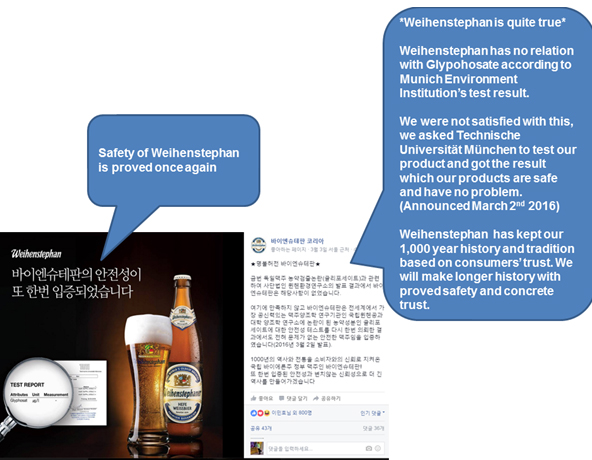Confusion over glyphosate detected in German beers
Bad news travel fast and to unexpected places. Only three days after German media reported that a Munich environmental institute had detected traces of the weed killer glyphosate in 14 German beer brands, Korean retailers and restaurateurs on 29 February were biting their nails, wondering whether to place any more orders with the country’s importers of German beers.
The timing couldn’t have been worse, as the popularity of imported beer is soaring.
Until recently, the entire domestic market was controlled by two breweries, Oriental Brewery (OB) and Hite-Jinro and their bland lager beers. But this has begun to change with beer imports reaching 19 percent of the total market in 2015 (including foreign beer manufactured in Korea), a dramatic increase from 4 percent in 2010.
Imported beer brands represented 1.71 million hl in 2015. German beer had a 15 percent share of the segment, ranking second behind Japanese beer.
According to E-Mart, Lotte Mart and Homeplus, Korea’s top three hypermarket chains, sales of imported beer sales now account for around 40 percent of their total beer sales (Source: 1 June 2015, The Chosun Daily).
As there is no international industry standard for non-harmful glyphosate levels, confusion reigns and importers worry about the future of their business.
Moreover, industry players are baffled because the incident happened in Germany, whose beers are renowned for their purity. Korean retailers are concerned that the scandal will harm the segment of imported beer.
Unlike the controversy over carcinogens in processed meats, industry watchers say that the danger of the harmful substances detected in German beer is unclear, making it difficult to conclude that the amount consumed regularly by consumers will cause harm to the human body.
However, many observers remain concerned that the controversy will create distrust in imported beer as such.
Keywords
imports beer market Germany sales glyphosate environment exports
Authors
Ina Verstl
Source
BRAUWELT International 2016

